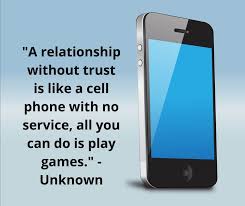The Foundational Elements of a Trusting Relationship
 Trust.
Trust.
It’s one of those words we all use when talking about relationships, but living it out is something else entirely. Whether it’s a romantic partnership, a friendship, or even a work relationship, trust is the invisible glue that holds people together. Without it, every conversation feels heavy, every doubt grows louder, and every little misunderstanding can spiral into conflict.
But here’s the thing—trust isn’t built overnight. It’s built in the small, everyday moments where you prove to each other that your words and actions line up. And just as it takes time to build, it also requires constant care to maintain.
So, what really goes into building and keeping trust alive? Let’s break it down.
1. Consistency in ActionsIt’s easy to say the right words, but trust grows when actions consistently back them up. When you show up when you said you would, call when you promised to, or follow through on commitments—big or small—you’re telling your partner, “You can count on me.” On the flip side, inconsistency—even in little things—can plant seeds of doubt. Think about it: if someone is late or forgets commitments often, over time it makes you question whether you can depend on them for bigger responsibilities.
2. Honesty, Even When It’s HardBeing truthful isn’t just about avoiding lies—it’s about choosing transparency even when it feels uncomfortable. Telling your partner you overspent on the budget, admitting you forgot an errand, or owning up to how you’re really feeling—these moments matter.
Honesty builds trust because it reassures the other person that they’re seeing the real you, not a polished version you think they want. It might spark tough conversations in the short term, but it prevents cracks in the relationship long term.
3. Vulnerability & OpennessTrust deepens when you let your guard down. Sharing your insecurities, fears, and dreams shows your partner that you’re willing to be seen fully—and that you believe they’ll handle your truth with care.
Vulnerability is scary, no doubt. But every time you open up and your partner responds with empathy instead of judgment, it strengthens the bond.
4. Respecting BoundariesA lot of people forget this one: respecting each other’s boundaries is a huge part of trust. Boundaries can look like personal space, alone time, privacy with certain things, or even limits around technology and social media. When boundaries are respected, people feel safe. And safety is the soil where trust grows.
5. Reliability During Hard TimesIt’s easy to be present when everything is fun and exciting. But the real test of trust comes in hard seasons—when jobs are lost, health issues pop up, or life throws curveballs. Showing up for your partner in these moments, even if it’s just listening, offering comfort, or standing beside them when things are messy, communicates loudly: “I’m not going anywhere.”
6. Owning Mistakes & Making RepairsNobody is perfect. Mistakes, broken promises, or even moments of betrayal happen. What matters is how they’re handled.
Apologizing sincerely, taking responsibility, and actively working to rebuild trust is often more powerful than pretending mistakes didn’t happen. A heartfelt, “I was wrong, and I want to do better,” carries far more weight than defensiveness or excuses.
Maintaining Trust Over TimeBuilding trust is step one, but keeping it alive is an ongoing process. Relationships evolve, life changes, and with it, the ways we need to show up for each other also shift. Here are some practical ways to keep trust strong:
Final Thoughts
Trust isn’t flashy. It’s not built in big romantic gestures or grand promises—it’s built in small, steady, everyday actions. When you keep showing up with honesty, respect, and reliability, your relationship develops a strong foundation that can weather storms and grow even stronger over time. At its core, trust says: “I’ve got you, and you’ve got me.” And in a world that often feels uncertain, there’s nothing more grounding than that.Was this post helpful?
Comments (1)
The message is apt.
Leave a Comment
Related Topics

A Relationship Without Trust Is Like a Cell Phone With No Se...
"A relationship without trust is like a cell phone with no service— all you can...

About 9jaruns Dating App/Website
Let's Hook You Up

Best Love Advise That Lasts: Building From Within
Why Self-Love, Friendship, and Respect Are the Cornerstones of Real Relationship...

When Love Gets Hard: Navigating Relationship Challenges with...
Why every couple struggles — and how African couples can turn challenges into st...

Beyond Lust: Healthy Ways African Men Can Nurture Passion, I...
Building Stronger Bonds Through Love, Understanding, and Emotional Connection
